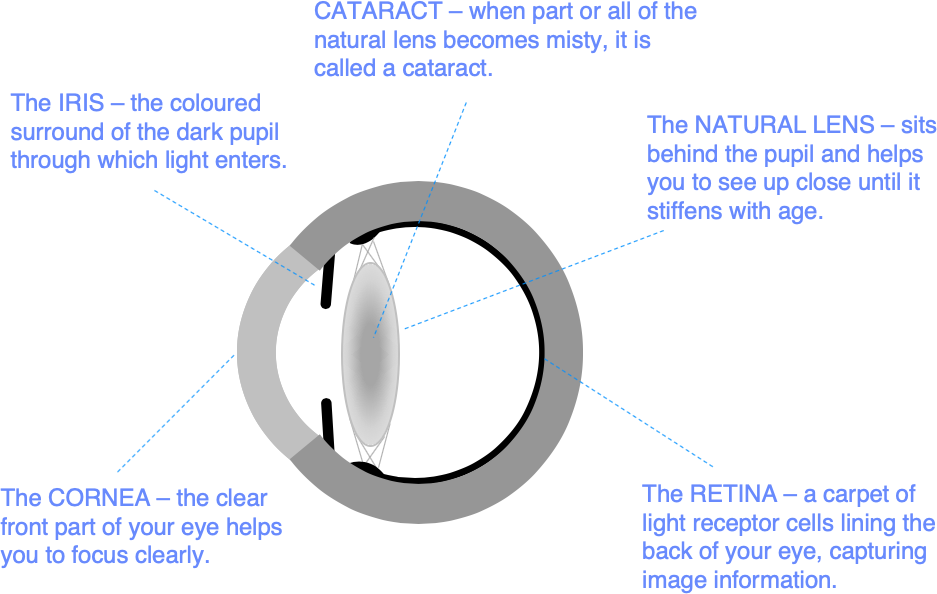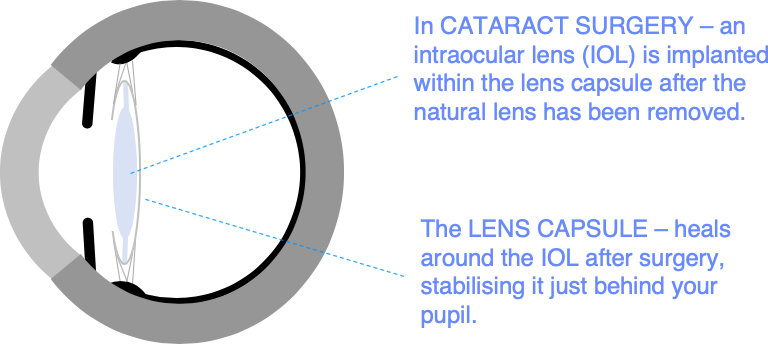You are here:
- Your Eyes / Cataracts
Cataracts
When part or all of the natural lens becomes misty, it is called a cataract.

The natural lens normally starts out clear and flexible. As we get older, first the natural lens loses flexibility, and we start to need help from reading glasses; then the natural lens starts to lose clarity. Most people will have at least some degree of cataract in old age, and one in three will have cataract surgery.
You do not have to be elderly to have cataracts. Some people are born with them, and they are not uncommon in younger people. The age at which we develop cataracts is, like so many aspects of our health, genetically determined to a large degree. Cataracts can also be caused by injury to the eye, some drug treatments, and smoking.
Not all cataracts affect vision. Localised opacities in the lens are common, and may cause no symptoms. You only need treatment for cataracts if they are interfering with your vision and the things you want or need to do (driving, reading, work, sport). If you are happy with your vision, even if you have been told you have cataracts, you do not need treatment.
If you are developing cataracts, common problems with vision in the early stages include light scatter, glare from oncoming car headlights, and changes in your spectacle prescription.
Cataract Surgery
The treatment for cataract is to replace the misty lens with a new lens called an intraocular lens (IOL). The results of this operation are the same whether it is performed for early or late stage cataracts. So, cataract surgery is always a routine, or ‘elective’ operation – it is up to you to say when you are ready to go ahead with it.

The operation is a 20-minute day case procedure performed using drop anaesthetic. It is keyhole surgery with a quick recovery and simple aftercare. We now normally perform surgery on both eyes in the same operating session, and you can wash, shower, and be active from day one after surgery.
You can find detailed further information on cataract surgery and IOL choices under Procedures on this site.
IOL implantation is a bit like building your glasses or contact lenses into your eyes, and cataract surgery is a very good opportunity to become less dependent on glasses. There are two main IOL types:
-
monofocal IOLs – these IOLs aim to optimise visual quality, but you will still need glasses for some activities after treatment.
-
multifocal IOLs – multifocal IOLs aim to reduce spectacle dependence for a wider range of activities, including distance (driving, outdoor activity) intermediate (computer screens) and near (reading) vision.
If you are suitable for cataract surgery, we will discuss which IOL type is the best option for you at your consultation.
Preparing for your consultation
If you are a soft contact lens wearer, you should leave your contact lenses out for 3 days before your consultation. Rigid contact lenses should be left out for 2 weeks. Contact lens wear can temporarily change the surface shape of your cornea. We ask you to leave your contact lenses out to help ensure that scan information we will use to guide your treatment is as accurate as possible.
You will normally be with us for 1-2 hours to allow time for scanning, refraction testing, eye health screening and procedure advice. There is usually some waiting between stages of the consultation, so bring something to read or to listen to.
We often dilate your pupils to help examine the back of your eye. This can make driving more difficult for several hours afterwards. Parking is restricted in central London. So, we would recommend travelling to us using public transport or taxi.
The nearest tube station is OLD STREET (Northern Line).
Appointments and enquiries
To arrange a private consultation, please telephone Angelique Thomas on 020 7566 2156 or 07484 081815 (or from outside the UK +44 20 7566 2156 or +44 7484 081815) or email moorfields.ballan@nhs.net
For NHS treatment with Mr Allan’s team at Moorfields, you will need a referral from your GP or Ophthalmic Surgeon. Referrals should be addressed to Mr Bruce Allan, Consultant Ophthalmic Surgeon, Moorfields Eye Hospital, City Rd, London EC1V 2PD. If you have any difficulty with your NHS referral, please call Barbara Stacey, NHS secretary to Mr Allan on 020 7566 2320, or email barbarastacey@nhs.net.
